人教版八年级下册Unit 8Have you read Treasure Island yet? Section A 3a~3c课件(共19张PPT)
文档属性
| 名称 | 人教版八年级下册Unit 8Have you read Treasure Island yet? Section A 3a~3c课件(共19张PPT) | 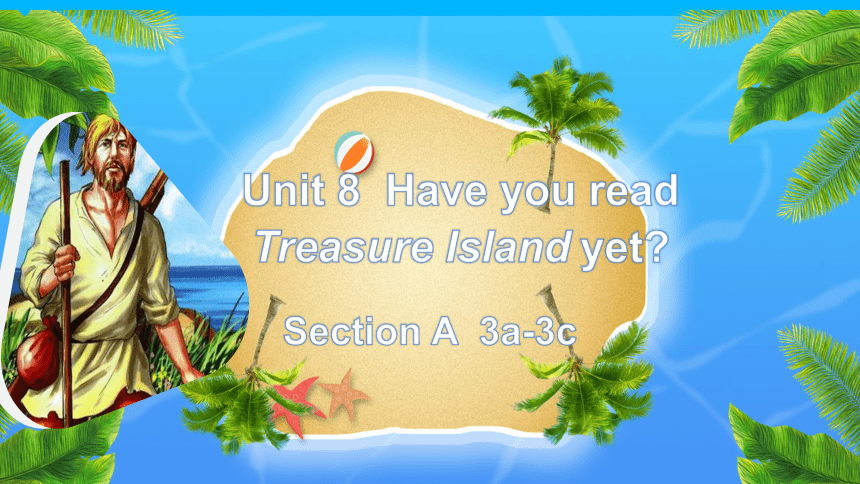 | |
| 格式 | pptx | ||
| 文件大小 | 30.7MB | ||
| 资源类型 | 教案 | ||
| 版本资源 | 人教新目标(Go for it)版 | ||
| 科目 | 英语 | ||
| 更新时间 | 2024-05-16 15:59:43 | ||
图片预览

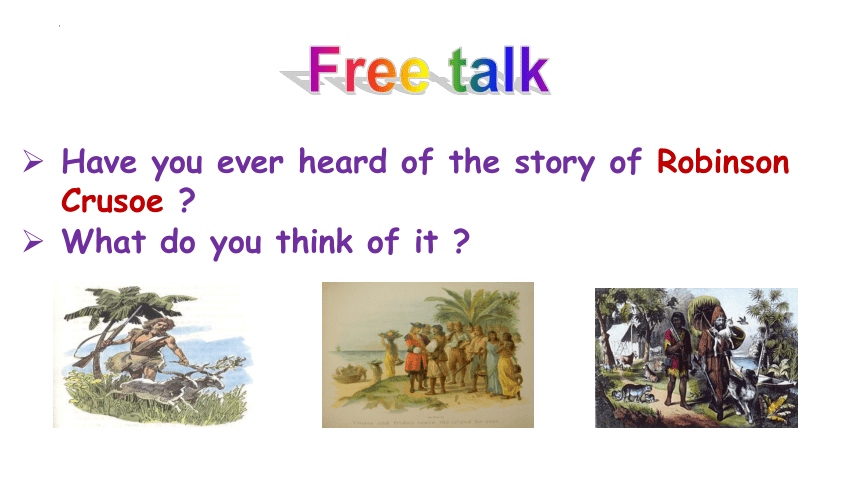
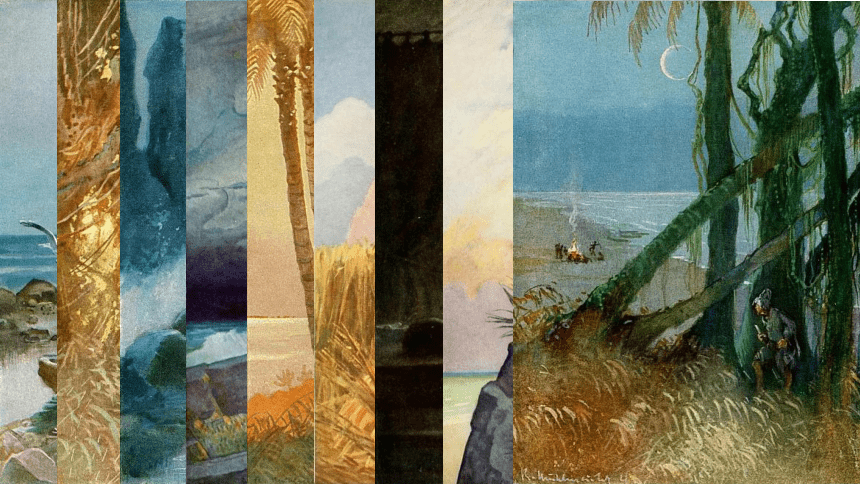
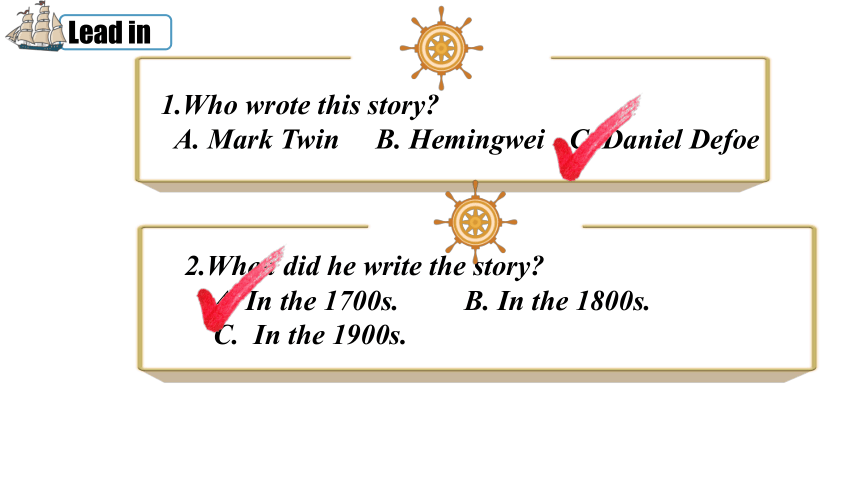
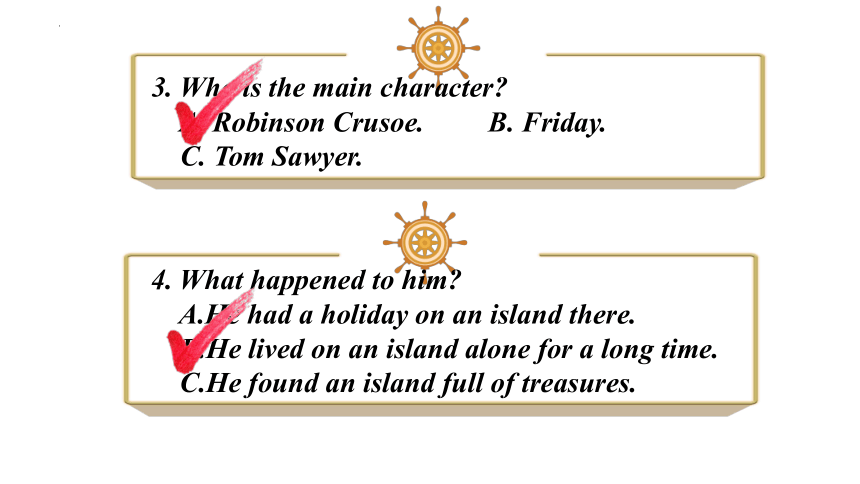
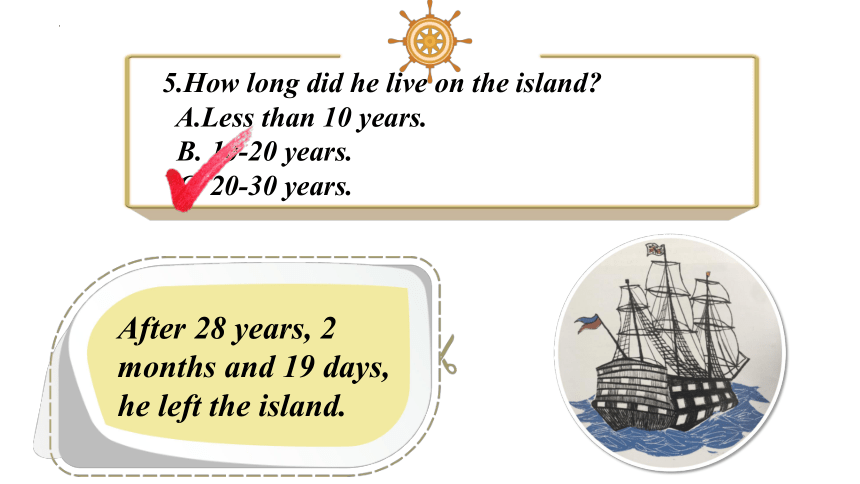
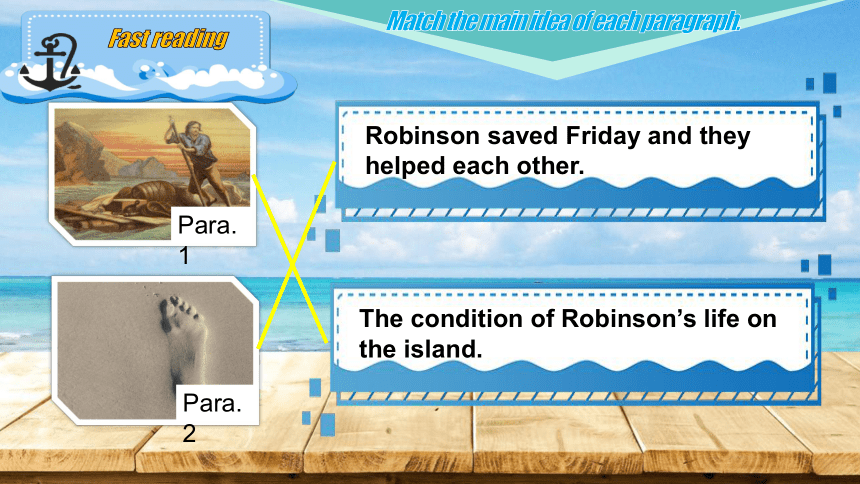
文档简介
(共19张PPT)
Unit 8 Have you read Treasure Island yet
Section A 3a-3c
Free talk
Have you ever heard of the story of Robinson Crusoe
What do you think of it
1.Who wrote this story
A. Mark Twin B. Hemingwei C. Daniel Defoe
Lead in
2.When did he write the story
A. In the 1700s. B. In the 1800s.
C. In the 1900s.
3. Who is the main character
A. Robinson Crusoe. B. Friday.
C. Tom Sawyer.
4. What happened to him
A.He had a holiday on an island there.
B.He lived on an island alone for a long time.
C.He found an island full of treasures.
5.How long did he live on the island
A.Less than 10 years.
B. 10-20 years.
C. 20-30 years.
After 28 years, 2 months and 19 days, he left the island.
Fast reading
Robinson saved Friday and they helped each other.
The condition of Robinson’s life on the island.
Para.1
Para.2
Match the main idea of each paragraph.
Read Para.1 and fill in the chart
Difficulties Ways to survive
No food
No house
No weapon
No boat
He has _______________
He has _______________________
He___________________with a gun.
He is learning to____________________.
He has ________________________
He has _______________
made a small boat.
brought back food and drink.
kills animals and birds
grow fruit and vegetables
cut down trees and built a house.
brought back guns.
1. You can use these to shoot things: _____
2. Something you use to travel in the sea: ________
3. A piece of land in the middle of the sea: ______
4. You can use these to cut things: ______
5. Signs left behind by someone or something: ______
guns
ship/boat
island
knives
marks
Read the passage again. Find words that have these meanings.
3b
Careful-reading Para 2
Q1.What did he see?
He saw some cannibals trying to kill two men from broken.
Q2.Did he save the two men
No. One died, the other man ran towards him. Robinson helped and saved him.
Careful-reading Para 2
Q3. Why did Robinson call the man Friday
Because that was the day they met.
Q4.Do you think they are friends
This man now lives with me and helps me. I named him Friday because that was the day I met him. He is smart and I have already taught him some English.
Yes.
Robinson isn't lonely anymore.
Para.2:
It turned out that Robinson was not alone on the island. He saved another man from the cannibals and named him Friday.
True or False
1. Robinson found the marks of another man's feet on the tree.
2. Robinson saw some robots trying to kill two men.
3. One of the two men died and the other ran towards his house.
4. Robinson named the man Friday because he liked Friday best.
5. Friday is stupid and he hasn't learned any English.
T
F
F
F
F
sand
cannibals
that was the day they met
smart
has
some
What do we learn from Robinson’s story
As long as there is life, there is a future and hope.
...
We should help others when they need it.
Discussion
As long as there is life, there is a future and hope.
Let’s read. Pay attention to the following phrases and sentences.
When I first arrived on this island, I had nothing. But I’ve found the ship and made a small boat. I’ve brought back many things I can use — food and drink, tools, knives and guns. Although I have lost everything, I have not lost my life. So I will not give up and I will wait for another ship. I have already cut down trees and built a house. I go out with my gun almost every day to kill animals and birds for food. I’m even learning to grow fruit and vegetables.
省略that/which的定语从句,修饰things
bring back
带回;使回忆起;使想起
A few weeks ago, I found the marks of another man’s feet on the sand. Who else is on my island How long have they been here Not long after that, I saw some cannibals trying to kill two men from a broken ship. One of them died but the other ran towards my house.
I helped him kill the cannibals. This man now lives with me and helps me. I named him Friday because that was the day I met him. He is smart and I have already taught him some English.
mark n. 迹象;记号;分数
v. 做记号;打分
on the sand 在沙滩上
辨析else与other:
else adv.常用在who, what, where等疑问词或something, nothing等不定代词之后。
other adj. 修饰名词,置于名词前
one … the other …
一个……另一个……,用于两者之间
some … the others …
一些……其余的……,用于三者或三者以上
辨析towards与to:
towards表示“向着某个方向”,没有“到达”之意
to一般位于walk, get, go, come等动词之后,有“到达”之意。
到达岛上
带回来很多东西
丢失某人的性命
放弃
等待
砍树
带着枪外出
arrive on the island
bring back many things
lose one’s life
give up
wait for
cut down trees
go out with a gun
Phrases in the passage
a few weeks ago
not long after that
run towards my house
help sb. (to) do sth.
live with sb.
8. 捕杀动物和鸟作为食物
9. 学习种水果和蔬菜
kill animals and birds for food
learn to grow fruit and vegetables
10. 几个星期以前
11. 在那之后不久
12. 朝我的房子跑去
13. 帮助某人做某事
14. 和某人一起住
Try to retell
Para. 1: Life after first arriving
things: had nothing
found the ship
brought back many things
made a small boat
house: cut down trees
built a house
food: go out
Para. 2: Meet Friday
save Friday: found the marks
helped him kill the cannibals
live with Friday: named him Friday
kill animals and birds
grow fruit
and vegetables
not give
up and wait for another ship
saw some cannibals
the other ran
taught him some English
1. Learn the new words and expressions by heart.
2. Retell the story of Robinson Crusoe.
Homework
Unit 8 Have you read Treasure Island yet
Section A 3a-3c
Free talk
Have you ever heard of the story of Robinson Crusoe
What do you think of it
1.Who wrote this story
A. Mark Twin B. Hemingwei C. Daniel Defoe
Lead in
2.When did he write the story
A. In the 1700s. B. In the 1800s.
C. In the 1900s.
3. Who is the main character
A. Robinson Crusoe. B. Friday.
C. Tom Sawyer.
4. What happened to him
A.He had a holiday on an island there.
B.He lived on an island alone for a long time.
C.He found an island full of treasures.
5.How long did he live on the island
A.Less than 10 years.
B. 10-20 years.
C. 20-30 years.
After 28 years, 2 months and 19 days, he left the island.
Fast reading
Robinson saved Friday and they helped each other.
The condition of Robinson’s life on the island.
Para.1
Para.2
Match the main idea of each paragraph.
Read Para.1 and fill in the chart
Difficulties Ways to survive
No food
No house
No weapon
No boat
He has _______________
He has _______________________
He___________________with a gun.
He is learning to____________________.
He has ________________________
He has _______________
made a small boat.
brought back food and drink.
kills animals and birds
grow fruit and vegetables
cut down trees and built a house.
brought back guns.
1. You can use these to shoot things: _____
2. Something you use to travel in the sea: ________
3. A piece of land in the middle of the sea: ______
4. You can use these to cut things: ______
5. Signs left behind by someone or something: ______
guns
ship/boat
island
knives
marks
Read the passage again. Find words that have these meanings.
3b
Careful-reading Para 2
Q1.What did he see?
He saw some cannibals trying to kill two men from broken.
Q2.Did he save the two men
No. One died, the other man ran towards him. Robinson helped and saved him.
Careful-reading Para 2
Q3. Why did Robinson call the man Friday
Because that was the day they met.
Q4.Do you think they are friends
This man now lives with me and helps me. I named him Friday because that was the day I met him. He is smart and I have already taught him some English.
Yes.
Robinson isn't lonely anymore.
Para.2:
It turned out that Robinson was not alone on the island. He saved another man from the cannibals and named him Friday.
True or False
1. Robinson found the marks of another man's feet on the tree.
2. Robinson saw some robots trying to kill two men.
3. One of the two men died and the other ran towards his house.
4. Robinson named the man Friday because he liked Friday best.
5. Friday is stupid and he hasn't learned any English.
T
F
F
F
F
sand
cannibals
that was the day they met
smart
has
some
What do we learn from Robinson’s story
As long as there is life, there is a future and hope.
...
We should help others when they need it.
Discussion
As long as there is life, there is a future and hope.
Let’s read. Pay attention to the following phrases and sentences.
When I first arrived on this island, I had nothing. But I’ve found the ship and made a small boat. I’ve brought back many things I can use — food and drink, tools, knives and guns. Although I have lost everything, I have not lost my life. So I will not give up and I will wait for another ship. I have already cut down trees and built a house. I go out with my gun almost every day to kill animals and birds for food. I’m even learning to grow fruit and vegetables.
省略that/which的定语从句,修饰things
bring back
带回;使回忆起;使想起
A few weeks ago, I found the marks of another man’s feet on the sand. Who else is on my island How long have they been here Not long after that, I saw some cannibals trying to kill two men from a broken ship. One of them died but the other ran towards my house.
I helped him kill the cannibals. This man now lives with me and helps me. I named him Friday because that was the day I met him. He is smart and I have already taught him some English.
mark n. 迹象;记号;分数
v. 做记号;打分
on the sand 在沙滩上
辨析else与other:
else adv.常用在who, what, where等疑问词或something, nothing等不定代词之后。
other adj. 修饰名词,置于名词前
one … the other …
一个……另一个……,用于两者之间
some … the others …
一些……其余的……,用于三者或三者以上
辨析towards与to:
towards表示“向着某个方向”,没有“到达”之意
to一般位于walk, get, go, come等动词之后,有“到达”之意。
到达岛上
带回来很多东西
丢失某人的性命
放弃
等待
砍树
带着枪外出
arrive on the island
bring back many things
lose one’s life
give up
wait for
cut down trees
go out with a gun
Phrases in the passage
a few weeks ago
not long after that
run towards my house
help sb. (to) do sth.
live with sb.
8. 捕杀动物和鸟作为食物
9. 学习种水果和蔬菜
kill animals and birds for food
learn to grow fruit and vegetables
10. 几个星期以前
11. 在那之后不久
12. 朝我的房子跑去
13. 帮助某人做某事
14. 和某人一起住
Try to retell
Para. 1: Life after first arriving
things: had nothing
found the ship
brought back many things
made a small boat
house: cut down trees
built a house
food: go out
Para. 2: Meet Friday
save Friday: found the marks
helped him kill the cannibals
live with Friday: named him Friday
kill animals and birds
grow fruit
and vegetables
not give
up and wait for another ship
saw some cannibals
the other ran
taught him some English
1. Learn the new words and expressions by heart.
2. Retell the story of Robinson Crusoe.
Homework
同课章节目录
- Unit 1 What's the matter?
- Section A
- Section B
- Unit 2 I'll help to clean up the city parks.
- Section A
- Section B
- Unit 3 Could you please clean your room?
- Section A
- Section B
- Unit 4 Why don't you talk to your parents?
- Section A
- Section B
- Unit 5 What were you doing when the rainstorm came
- Section A
- Section B
- Review of Units 1-5
- Unit 6 An old man tried to move the mountains.
- Section A
- Section B
- Unit 7 What's the highest mountain in the world?
- Section A
- Section B
- Unit 8 Have you read Treasure Island yet?
- Section A
- Section B
- Unit 9 Have you ever been to a museum?
- Section A
- Section B
- Unit 10 I've had this bike for three years.
- Section A
- Section B
